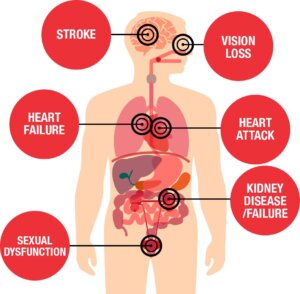Blood Pressure Uncuffed™ Volume 2: What is High Blood Pressure (HBP)?
November 27, 2023. By Sophie Cook
Before we get into specifics of high blood pressure (HBP) also called hypertension, let’s talk about the basics of blood pressure. Blood Pressure is the amount of force your blood is exerting against the walls of your arteries. Blood pressure readings consist of two numbers; systolic (top number) and diastolic (bottom number). Systolic BP is the pressure in your arteries as your heart beats (1). Diastolic BP is the pressure in your arteries when your heart is at rest (1). A “Normal” reading is anywhere from 120/80 mmHg or lower.
So, what is HBP then?
Someone is considered hypertensive when their blood pressure rests at 130/80 mmHg or higher (2). If a measure reads over 180/120 mmHg you could be experiencing a hypertensive crisis and should seek medical attention immediately (2). A hypertensive crisis puts you at an increased risk for heart attacks, strokes, and other cardiovascular problems.
What Causes HBP?
HBP is usually developed over time. This could be due to a gradual buildup of plaque in arteries, or due to lifestyle choices like not exercising regularly or an unhealthy diet. Some health conditions like diabetes, obesity, and even pregnancy can also increase the risk of developing HBP (1).
Why should I be worried?
When your blood pressure is too high (anything over 130/80 mmHg) it causes your heart to work in overtime, which causes harm to your heart and blood vessels making them less efficient in sending blood out to the body (3). When this happens over an extended period, the high force and friction in your vessels can damage the surrounding tissue. This is when bad cholesterol (LDL) and plaque starts to form along the tears in the damaged tissue making the arteries narrower and narrower causing your BP to rise again (3). This harmful cycle continues, and if not stopped it will cause extensive damage to the heart, blood vessels, and the rest of the body (3).
If not treated, HBP can increase stroke risk, cause vision loss, heart attacks, heart failure, kidney disease/failure, and sexual dysfunction (3). 
Are there symptoms?
Hypertension is nicknamed the ‘silent killer’ because typically there are no physical symptoms. The only way to know you have HBP is by getting your blood pressure checked regularly.
The only way to know if you have hypertension is to have your blood pressure checked. It is important to understand there are rarely symptoms, so by monitoring your BP regularly you can stay on top of your health status. If you see readings of 130/80 mmHg or higher, consult with your doctor for a proper diagnosis and course of treatment.
Sources: